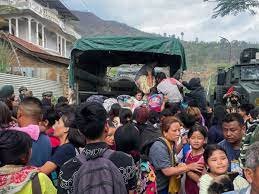In response to the recent outbreak of ethnic violence in Manipur, the Supreme Court of India has taken proactive measures to address the situation and ensure the safety and well-being of affected individuals. On May 8, the Court instructed both the Central Government and the Manipur Government to take necessary steps in raising security levels and initiating relief and rehabilitation efforts for those impacted by the violence.
Recognizing the gravity of the situation, a Bench led by Chief Justice D. Y. Chandrachud highlighted the need for immediate action to mitigate the loss of lives and properties. The Court took note of submissions asserting that no untoward incidents had been reported in the state over the past two days. With a focus on the humanitarian aspects of the aftermath, the Bench stressed the importance of making adequate arrangements in relief camps and ensuring that sheltered individuals have access to essential amenities such as food, ration supplies, and medical facilities.
Expressing deep concern for the lives lost and the destruction caused, the apex court called for comprehensive efforts to address the challenges faced by the affected communities. The Bench, consisting of Justices P. S. Narasimha and J. B. Pardiwala alongside Chief Justice Chandrachud, issued directives for the rehabilitation of displaced individuals and emphasized the need for adequate protection of places of religious worship.
In line with its commitment to safeguarding the fundamental rights of citizens, the Supreme Court’s intervention serves as a vital step towards restoring peace and normalcy in Manipur. By instructing the Central Government and the Manipur Government to take necessary measures, the Court aims to prevent further violence and ensure the well-being of those affected.
The directives issued by the Court underscore the importance of providing security and relief to affected individuals. Efforts must be made to establish a sense of security among the affected communities, reassuring them that their safety is a top priority. By raising security levels, the governments can deter potential instigators and create an environment conducive to peace and harmony.
The relief and rehabilitation efforts, as emphasized by the Court, play a crucial role in addressing the immediate needs of those impacted by the violence. It is imperative to establish well-equipped and efficiently managed relief camps that can cater to the basic requirements of the affected individuals. Adequate provisions of food, ration supplies, and medical facilities should be ensured to alleviate their suffering and enable them to regain a sense of normalcy in their lives.
Furthermore, the Court’s directive to protect places of religious worship is a significant step towards fostering communal harmony and safeguarding the rights of religious minorities. Places of worship hold immense cultural and emotional value for communities, and any damage to these sites can exacerbate tensions and deepen social divisions. By ensuring their protection, the Court sends a strong message that the state is committed to upholding religious freedom and preserving the sanctity of all places of worship.
The Supreme Court’s intervention in the wake of ethnic violence in Manipur demonstrates its commitment to safeguarding lives, protecting properties, and addressing the humanitarian concerns arising from the situation. By instructing the Centre and the Manipur Government to take necessary steps for security, relief, and rehabilitation, the Court aims to restore peace and normalcy in the affected areas. It is crucial for the governments to promptly implement these directives and work collaboratively to provide immediate relief to the affected individuals while fostering an environment of tolerance and inclusivity.


